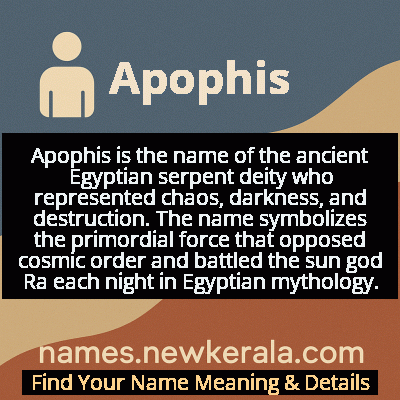Apophis Name Meaning & Details
Origin, Popularity, Numerology Analysis & Name Meaning of Apophis
Discover the origin, meaning, and cultural significance of the name APOPHIS. Delve into its historical roots and explore the lasting impact it has had on communities and traditions.
Name
Apophis
Gender
Male
Origin
Egyptian
Lucky Number
3
Meaning of the Name - Apophis
Apophis is the name of the ancient Egyptian serpent deity who represented chaos, darkness, and destruction. The name symbolizes the primordial force that opposed cosmic order and battled the sun god Ra each night in Egyptian mythology.
Apophis - Complete Numerology Analysis
Your Numerology Number
Based on Pythagorean Numerology System
Ruling Planet
Jupiter
Positive Nature
Optimistic, inspirational, and creative.
Negative Traits
Scattered, exaggerating.
Lucky Colours
Yellow, gold, purple.
Lucky Days
Thursday.
Lucky Stones
Yellow sapphire.
Harmony Numbers
1, 2, 9.
Best Suited Professions
Arts, writing, communication.
What People Like About You
Creativity, optimism.
Famous People Named Apophis
Apophis
Mythological Deity
Primary antagonist in Egyptian mythology, serpent god of chaos who battled Ra each night
Apophis (Apep)
Cosmic Entity
Embodiment of isfet (chaos) opposing ma'at (order), featured in funerary texts and temple inscriptions
99942 Apophis
Celestial Object
Near-Earth asteroid discovered in 2004, named after the Egyptian deity due to its potential threat
Name Variations & International Equivalents
Click on blue names to explore their detailed meanings. Gray names with will be available soon.
Cultural & Historical Significance
The cultural significance extended beyond mythology into daily life and royal ideology. Pharaohs were seen as upholders of ma'at against the forces of isfet (disorder) that Apophis represented. In funerary practices, the deceased needed protection from Apophis during their journey through the underworld, leading to numerous spells in the Book of the Dead specifically aimed at defeating the chaos serpent. Temples featured ritual destruction of Apophis effigies, and the concept influenced Egyptian art, literature, and political ideology for millennia. The persistence of Apophis in Egyptian thought demonstrates how central the balance between order and chaos was to their understanding of the cosmos and human existence.
Extended Personality Analysis
The name Apophis evokes personality characteristics centered around transformation, power, and challenging established norms. Individuals with this name are often perceived as possessing intense personal magnetism and a natural inclination toward leadership, though their leadership style may be unconventional or revolutionary rather than traditional. They tend to be highly independent thinkers who question authority and conventional wisdom, reflecting the mythological Apophis's role as the ultimate challenger to divine order. This name suggests someone comfortable with complexity and ambiguity, capable of navigating difficult situations and confronting shadow aspects of life that others might avoid.
There's often a creative-destructive duality to the Apophis personality - the same energy that can dismantle outdated systems can also build innovative new structures. These individuals may possess deep psychological insight and understanding of cyclical processes of death and rebirth in personal growth. While they can be perceived as intimidating or rebellious, their true strength lies in their ability to facilitate necessary change and transformation. The name carries an inherent sense of cosmic significance, suggesting someone who understands that progress often requires confronting and integrating darkness rather than avoiding it. This makes Apophis-named individuals potentially excellent at crisis management, innovation, and guiding others through profound personal transformations.
Modern Usage & Popularity
In contemporary naming practices, Apophis remains an exceptionally rare choice, primarily selected by parents with specific interests in Egyptian mythology, astronomy, or who desire a name with powerful mythological resonance. The name gained some modern visibility following the 2004 discovery of asteroid 99942 Apophis, which brought the ancient deity's name into scientific and popular discourse. Current usage is almost exclusively masculine and tends to appeal to families who value uniqueness, historical depth, and dramatic flair over conventional popularity. The name's strong association with chaos and destruction makes it a particularly bold choice that typically indicates parents with interests in mythology, fantasy literature, or alternative naming conventions. While statistically insignificant in most national naming databases, Apophis appears occasionally in online parenting communities focused on mythological names and among families with Egyptian cultural heritage or strong academic interests in Egyptology.
Symbolic & Spiritual Meanings
Symbolically, Apophis represents the essential chaos that enables transformation and the shadow aspects that must be acknowledged for true wholeness. As the eternal opponent of cosmic order, Apophis embodies the necessary tension between stability and change, reminding us that growth often requires the dissolution of existing structures. The serpent deity symbolizes the unpredictable forces of nature that resist human control and the dark, unknown aspects of existence that challenge our understanding of reality. In psychological interpretation, Apophis represents the collective shadow - those repressed elements of consciousness that, when confronted and integrated, lead to profound personal and spiritual evolution. The symbolic meaning extends to understanding that opposition is not merely destructive but creatively necessary, as the nightly battle between Apophis and Ra ensured the sun's daily renewal and the maintenance of cosmic balance. This makes Apophis a symbol of regenerative destruction and the chaotic potential from which new order emerges.

